|
FAQs on Pondfish Disease 5
Related Articles: Koi/Pond Fish Disease,
Livestock
Treatment System, Gas Bubble
Disease/Emphysematosis, Pond
Parasite Control with DTHP, Hole in the Side Disease/Furunculosis,
Goldfish Disease,
Related FAQs: Pondfish
Disease 1, Pondfish Disease 2,
Pondfish Disease 3, Pondfish Disease 4, Pondfish Disease 6,
Pondfish Disease 7, Pondfish Disease 8,
Pondfish Disease 9,
Pondfish Disease 10,
& FAQs on Pondfish
Disease: Prevention, Diagnosis, Environmental, Nutrition, Genetics, Social, Pathogenic, Mysteries, Medications/Treatments,
Goldfish
Disease,
|
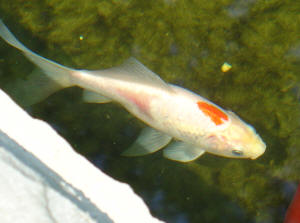
|
 |
Aquatic Gardens
Ponds, Streams, Waterfalls & Fountains:
Volume 1. Design & Construction
Volume 2. Maintenance, Stocking, Examples
V. 1
Print and
eBook on Amazon
V. 2
Print and
eBook on Amazon
by Robert (Bob) Fenner |
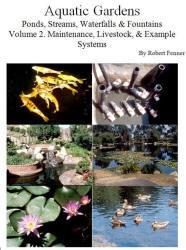 |
Gill problem, pond
9/25/08 Hello WWM crew. Recently, one of my larger
goldfish/carp feeder fish that grew too big got a gill problem.
Yellowish ball shaped thins are clinging to its gills, making it look
puffy. <Do need a photo here. Difficult to say what these might be.
Are these "balls" on the gill covers (the plates on the
outside of the gills that open and close) or the gills themselves (the
bright red filaments inside the gill chamber)? Argulus are parasites
the attached to the body and look like squished lice, being
circle-shaped but with obvious claws. Gill lice (Ergasilus) are more
maggot-like in shape, and attach directly to the gills. If we're
simply talking about ulcer-like swellings, that's Finrot or perhaps
Mouth Fungus, while waxy growths could be Carp Pox. Finally, you may
have a fish with cysts or tumours.> But yet it seems alright, it
eats regularly and swims as if there is nothing wrong. I'm
concerned though, since it looks bad to my eyes. I even made a water
change, but it didn't recede. What else should I do? Thanks again.
- Gene. <Can't give useful advice without knowing precisely what
the problem is. Do research the complaints listed above, and act
accordingly. Cheers, Neale.>
Exploding Goldfish 9/1/08
Hello, Upon going to
my pond this morning, I found one of my gold fish dead. There was a
protrusion of what looked like the oviduct and/or the colon from the
anal port. I was horrified! My pond is well established, no sickness or
problems, nothing which could have hurt the fish or mashed it. I have
seen pictures of dead fish where an attempt of egg stripping, had gone
terribly wrong, and this is what my dead one looked like. What in the
world happened? Thank you, Carolyn
<Mmmm, don't know... you state there were/are no markings on the
body itself? Otherwise I'd suspect a bird of prey here. I might try
placing a screen mesh over the pond. Bob Fenner>
Re: one-sided bloat... pond goldfish
hlth. 8/5/08 Dear Bob Fenner, <Hello again
Laurie> The pond has been in existence for 12 years. It is 1500
gallons, three feet deep, has an external pump with skimmer, a
waterfall and stream. I usually change the water by thirds, in the
spring over a period of weeks. <I would change some every week...
during the warm/er months... as detailed on WWM... Please learn to/use
the search tool, indices...:
http://wetwebmedia.com/PondSubWebIndex/Pond%20Sub%20Web.htm I use
Algaefix in the summer. <Mmm, this material... is problematical...
Please do read on WWM re... and other, less toxic means of algal
control> The water is non-chlorinated well water. The ph is normal,
<?> and all the usual things tested with strips <Not a fan of
this type of assay> are normal or negative. The pond is 2/3 thirds
covered by water lilies and tall plants. <Ahh, very good... for many
reasons, including this indicates that not too much algicide has been
being applied> I have approx. 20 gold fish that have been in the
pond for tens years. I have had babies born once and most disappeared
or died. <Strange these fish have not reproduced more often> It
seems for the last few years, there is always one of the larger
goldfish that develops this abnormality and has one sided bloat usually
on the rear half of body, (not including tail). Still has appetite.
Sometimes chased by others, This is why I always assume at first it has
eggs. <Mmm... again... goldfish are beset with many heritable
issues... but there may well be water quality issues here that your
testing does not address> I hope this is enough information for you
to make an educated guess Thank you, Laurie Kross <Bob
Fenner>
|
Convalescence, pond goldfish
7/26/08 Dear crew, Beatrice, the Sarasa comet, disappeared
from 5/5 to 5/16. This is my third and final note about the fish.
<Hello Max,> I didn't say then---our pond is only 1000
gallons; do you call this clear water? There are many rocks
placed to create a Byzantine network of passageways (in spite of
which, we have no surviving fry this year.) <The key to
Goldfish fry surviving seems (to me) to be thick tangles of
thread algae -- not what every pondkeeper wants! Goldfish prefer
to spawn among plants, and the fry instinctively stay among
plants where they will be safer than out in the open.> The
pond is right outside the door, and still fascinates me. It
contains three floods, so I'm out there several times a day,
right up until 10:00 at night, when the lights time out. I feed
the fish lightly and often, as many as 4 or 5 times/day. B. was
not seen from the night of May 4th until the morning of May 16th.
Period, paragraph. <Oh?> B. looks a lot better now. Even
two weeks ago, there was a boil on the left operculum, looking
like a staph infection. <Interesting.> Btw, I shot these
with a Sony Cyber-shot DSC V-1 by floating an aquarium in the
pond, with a couple of bricks in it. My fear that the tank would
confuse my camera's rangefinder was unfounded. <Amazing
pictures! I for one would enjoy seeing a write-up on your method.
Perhaps you'd consider writing (for money!) in the WWM
magazine, 'Conscientious Aquarist'.
http://www.wetwebmedia.com/ca/CA_Welcome.htm I suspect many other
pondkeepers would like to try this themselves.> Thanks for
your good advice. All I did for treatment was monitor the (3800
gph) pump house and add bio-clarifier whenever foam appeared,
just three times in the interval. <Sounds like a good plan.
Glad your fish is healthy, and your pond giving you such
pleasure.> Max <Cheers, Neale.>
Re: Convalescence Dear Neale, I'm
flattered that you find my set-up worthy of publication.
<It's a clever idea!> It seems so simple, now that I
did it, but I've been working on a more elaborate design for
months, and was stuck on the rangefinder issue: the camera would
focus on the glass and not the subject. The aquarium was an
elegantly simple solution. I'll put something together in a
few days. <Look forward to it.> One half of our pond is, by
mid-summer, a jungle of lilies, pickerel weed, and parrot
feather, q.v. (Notice both frogs!) Last year, with only six
adults, we had fourteen spawn survive. We brought six indoors,
and with comings and goings, we had thirteen in the pond come
May. The fry haven't stood a chance. Not that I mind. I must
clean the filter every day, as it is. It's a good population,
about 100 inches of fish in 1000 gallons. <Sounds/looks a nice
tank. Does sound as if your tank has reached a sort of carrying
capacity where there are now so many adults the juveniles
can't survive.> <Cheers, Neale.>
|
|
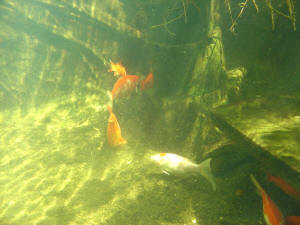 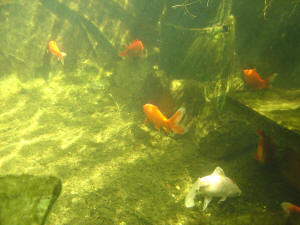
|
|
Annual Report to Bob Fenner 05/03/09
Dr. Bob, almost a year after she disappeared (see "Whoever
wrote "I enjoy being a girl" wasn't a
goldfish,") you can see in the attached that Beatrice, the
Sarasa, is doing just fine. Beatrice and nacreous Ginger are both
nearly 4, and are a foot long or a fraction less. The other four
in the photo are second-year offspring in the 6-7" range.
It's just that I continue to have my doubts about Beatrice.
Beatrice definitely has the heavy body of a female, but she is
androgynous as it gets - she chases at least as much as she is
chased,
<Mmm, had to look this word up after the daily crossword...
"hoyden"... for tomboy>
but I have yet to see her involved in spawning (although
presumably that's how she got her scars last year.)
<Quite common>
She's the most avid egg-eater. We're in a Zone 6 climate.
Friday the 24th, the water temp crossed 75 degrees, and the next
morning was the first spawning of the season. As usual, Beatrice
watched, and then dined. She's healthy, though.
Thank you for your wise counsel.
Max
<And you for this report. Bob Fenner>
|
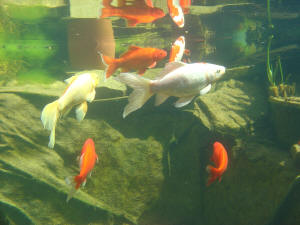 |
|
Butterfly koi lockjaw
disease 7/17/2008I have had this butterfly koi
(golden). for over a year. I have a 4000 + gallon pond and added
some more butterfly koi about 3 months ago. The golden one was
kind of scrawny and never ate much until we bought other
butterfly koi and then it became quite the eater and aggressive
fish when it came to eating. <Mmm, Koi/carp (both Cyprinus
carpio) are social animals> today I came home and it has some
kind of lockjaw thing going on. <? A deformity... likely
genetic, ontogenetic> ugh. what do I need to do. I was going
to leave him in the pond over night and if he doesn't get any
better, <?> I was going to pull him out and look in his
mouth. I don't know if it ate too much food or sucked up a
rock or just what the heck happened. Help. Goldenboy is a
favorite. Thanks. Lenn R. Neal <Mmm, I would carefully net
this fish, see if a stone or such might be stuck in its mouth...
otherwise I'd do nothing... Is not "catching". Bob
Fenner>
Re: butterfly koi lockjaw disease
-07/18/08 Hey Bob... I did catch the fish with a net and put
it in a separate tank, we did look for a stone or any kind of
obstruction while it was in the net, but seen nothing of the
sort, just tissue you would see of the inside of it's mouth.
<The jaw is likely dislocated or broken. Sometimes happens
with Koi and Goldfish, supposedly because they inhale some gravel
or similar solid object. No idea if that's true or not, but
in any even if the jaw moves freely but the fish can't keep
its mouth closed, that's the problem. Some vets may be able
to help relocate dislocated jaws (telephone around for your
nearest Koi specialist) but otherwise this is very difficult to
treat. The problem is that fish jaws bones are incredibly
delicate, far more so than our very primitive solid jaws. As
such, it is very difficult for the non-specialist to "man
handle" the bones back into position, and on anything
smaller than an adult Koi practically impossible even for a vet.
If the fish can't feed, it will obviously starve to death, so
this *is* a life-threatening injury. It is also possible that the
jaws are surrounded by swollen tissue, and this is forcing the
jaws open. This is a luckier scenario, because prompt treatment
with a broad spectrum, systemic antibiotic such as Erythromycin
can help (e.g., Maracyn) by reducing the swelling and allowing
the jaws to get back into alignment. But this is quite an
uncommon reason for the symptoms you are describing, and would
normally be present along with other signs of bacterial
infection, such as Finrot or white, stringy faeces.> The next
day after being in a separate tank it's lips are turning a
blackish color, and it's basically just sitting at the bottom
of the tank being mellow, I have tried putting a few pieces of
small food, but it isn't interested, I have it in a tank with
Mela Fix fish all purpose medicine. <Melafix is completely
useless in this situation, and arguably useless is most others as
well, so hardly an "all purpose medicine" any more than
a stiff shot of whisky is for humans.> I don't know what
else to do... Thanks for Your Help Lenn <Call a vet. Your
options for home therapy are limited. Cheers, Neale.>
|
| Missing
gill cover on Koi 7/6/08 We recently purchased a home (about 2
month ago) with a large pond 1600 gal that has both Koi and
goldfish. one of the smaller Koi 10" or so has a missing gill
cover. I don't know for sure when this happened I noticed the
red mark a couple a weeks ago. My question is what do we do, and
will the cover grow back or is the fish doomed? Currently he is
eating well, not being picked on by the other fish and doesn't
seem to be acting different from the other fish. To help you see
what I am talking about regarding the missing gill cover I am
attaching a few photo's. Also the water level are normal expect
the ph is 8 (I know high, but even with treatment we can't get
it to come down) and am afraid to change to fast since the other
fish seem fine. Per a suggestion at the pond store we have given
the fish a salt bath for 4 consecutive days. This did not seem to
impact him at all good or bad. Do you need any other information?
Thanks for you help Crystal <Hello Crystal. Sometimes fish are
born without opercula (gill covers). It is quite a common birth
defect among very inbred (and consequently genetically weak)
ornamental fish varieties, particularly things like Angelfish.
Opercula can also be lost following secondary infections or (more
likely with outdoor fish than aquarium fish) damage caused by
predators such as cats. In any case, opercula don't grow back
(so far as I know). On a healthy fish the operculum serves a number
of functions, and while not having opercula won't kill a fish,
it will be weakened to some extent. The delicate gill filaments are
more sensitive to mechanical damage, for example when you are
netting the fish. The opercula are also involved with ventilation,
so this fish will find breathing a bit more difficult than
otherwise. The main problem is really to ensure that any damaged
tissue heals completely before secondary infections can set in.
These sorts of wounds, if wound it is, can become septic or
fungused very quickly. Salt baths can help deal with keeping wounds
clean to some extent, but if the wound does become infected (i.e.,
you see necrotic (dead, white) tissue and threads of fungus) then
you will have to step up the treatment to something suitable for
such infections. Hope this helps, Neale.> <<This one looks
like it was excised... perhaps a jump against a very sharp edge?
RMF>> |
|
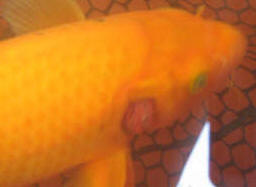 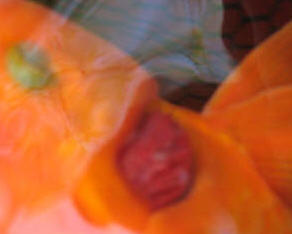
|
dead Koi 06/26/08 <...
Please... fix your English if writing us> the weirdest thing
happened , this morning I came out to check out my Koi pond, they were
all dead including a goby and a goldfish I have, yet none of the
suckerfish are dead. they had no lesions ,cuts, nothing I checked the
ph nitrite and nitrate they were perfect. the Koi themselves were sort
of inflated and mushy inside it looked like there innards were gushy
and one of females um hole? was open and red and it looked cut. one of
the males looked like it had a long round balloon coming out of his
belly. yesterday they seemed fine nothing really bad to mention. the
water seemed clouding and white , and it looked like oil had been
spilled in the water and looked like white little pieces of junk was in
the pond. can you help me out??? ? ????????????????????? it's so
weird, and it was so sudden please help me!! <... Something
happened... tis the season... likely either an oxygen depression during
the night, and/or a die-off of microbes/algae... need to read and heed
re dynamic equilibrium in pond maint., redundancy in filtration,
circulation, volume... where? On WWM. Bob
Fenner>
|
Sarasa comet
gasping for breath? Pond Troubles - Water Quality
06/08/2008 Hi Crew, <Hello, Amanda! Sabrina with you
today.> I hope that somebody is able to help. I have just
recently set up a new pond with just over 3000 litres and a
waterfall. <Approximately 800 US gallons, for metrics
challenged folks> I am using a Hozelock Cyprio Bioforce UVLC
8000ltr filter and an Oase Aquamax 3500 pump. The pond had been
up and running for about 3 weeks with plants etc. before I did a
first water check to be able to introduce some fish. The levels
were pH 8.5 and nitrite .1. <Wait, wait! What about that
all-important, deadly toxic compound, Ammonia? Please, this is
urgent.... Do be testing for Ammonia and Nitrate in addition to
pH and Nitrite. Ammonia and Nitrite in ANY concentration should
be treated as toxic or deadly. pH should remain stable - goldfish
are very tolerant animals - though closer to 7.0 would be nice,
stability is far more important than precision. I would prefer
not to take goldfish above 8.0 if possible, but again, stability
is far, far more important here. Nitrate you'll want to aim
to keep as low as possible, probably with plants and a low
stocking density as water changes in a pond aren't
necessarily easy or fast.> I gave these levels to the aquatic
centre and they assured me that it would be fine to introduce
some fish. <.... Did they not question the presence of
Ammonia?? I would be VERY cautious here.... Dead fish mean
you'll buy more fish. I am not saying your local shop is
unscrupulous, just that some very few are. Further, even some
great shopkeepers can forget new hobbyists' lack of knowledge
or experience and recommend courses of action that they, in their
experience, might be able to handle but which a new hobbyist
maybe just doesn't have the experience or knowledge to deal
with.> I bought just 6 fish to start....2 Sarasa, 2 canary
yellow goldish and 2 red comets. Everything seemed to be going
fine. 10 days later I decided to introduce some more fish...I did
another water check and levels were much the same...nitrite
slightly higher (between .1 and .25), <Dangerous, here....
this *needs* to be zero to be considered "safe"....
Please do NOT add any more life to this system until this
"cycling" is under control. There is much information
on WetWebMedia regarding establishing the "cycle" that
will keep your livestock alive and well. Please start here:
http://www.wetwebmedia.com/FWSubWebIndex/fwestcycling.htm .>
...think I may have overfed the first fish slightly. so I reduced
their feed to help lower the level. I also checked nitrate which
was 10mg/l. <This is a safe/appropriate level.> I gave the
levels to the same centre as before, who again said everything
was okay to introduce some more fish. <Whaaaaaat?? All that
fish "want" in life is a proper environment, a bit of
food, and maybe some pals to spawn with. Focus on the proper
environment, and you'll do very well. Again, in short:
Ammonia and Nitrite must be ZERO, Nitrate less than 20ppm
(ideally - a little higher may not be too bad, but can lead to
trouble), pH *stable*, and ideally closer to 7-ish (once more,
stability is key - if 8.0 is easy to maintain, then 8.0 it is.)
Please know that Ammonia or Nitrite in any concentration can lead
to real issues. Further, Ammonia is "more toxic" at
higher pH, so this is even more important in your case.> This
time (yesterday) I purchased 7 fish...(2 Sarasa, 3 golden tench
and 2 Shubunkin) all fish around 2-3 inches long. <Do please
be concerned.... and begin changing water right now, if you
can.... and please, no more fish until this environment is much,
much more stable.> The smallest Sarasa almost since being
introduced (after a couple of hours) to the pond, has been at the
surface 'gasping' for breath, he is also not moving
around that much....at times it almost appears that he is in a
trance and just 'floats' with his the tip of his head out
of the water. <Trouble.... Symptoms of a problem (Ammonia or
Nitrite) in the environment.... Do not add medications for this;
rather, *change some water*. Good water quality is of the utmost
importance here. Be sure to dechlorinate new water. Keep that
waterfall running for good oxygenation.> I have read some of
the FAQ on suffocation and can only assume that it might be
parasites as none of the other causes seem to be relevant.
<This is more likely environmental than pathogenic. I would
work first on correcting the environment. Even if there IS a
parasitic complaint as well, the environment must first be safe
and stable before you tackle treating a pathogen.> I just
wondered if this might be correct because I don't want to
lose the fish, however, I do not wish to give unnecessary
medication or introduce anything to the pond that might affect
the other fish. <Gooooood job, and kudos to you!!> If it is
parasites, is there anything that I can clearly look out for to
help diagnosis? <Certainly! Observe the animal as closely as
possible. Fix the environment before taking any other actions
(e.g., do some water changes). Look at the fish's skin; look
for any "obvious" parasites, as well as other
abnormalities.... Streaks or inflammation in the fins and body
may well be attributable to simple poor water quality (again,
presence of Ammonia and/or Nitrite). Trust your gut instinct, do
not add medications or other chemicals to the water until/unless
you *know* you have a real pathogen to battle. You might do well
to remove the little Sarasa and quarantine him separately from
the others, in case there is something communicable present. I
still rather suspect that this is just environmental.> Also,
if this is the case, would it be infectious to my other fish as
currently they all appear to be fine. (The Sarasa both came from
the same tank at the aquatic centre). <Coming from the same
tank doesn't necessarily mean that he can't have
something the others don't, but really.... chances are that
this one little Sarasa is, for whatever reason, more susceptible
to poor water quality than the others. You mention that he's
small; young fish often show problems sooner than older fish.
Test your water, get Ammonia and Nitrite to zero with water
changes, and you'll be off to a great start.> Sorry to be
so long-winded, but I wanted to give as much background and
information as possible so that you might be able to help.
<Don't apologize for this, please! You did very well to
provide the information that you have. Thank you for being
detailed.> Thanks in advance, Kind regards, Amanda <Best
regards to you and your fishy pals! -Sabrina C.
Fullhart>
Re: Sarasa comet gasping for breath?
Pond Troubles - Water Quality II - 06/09/2008 Hi Sabrina
<Hi, Amanda!> Thank you so much for your information and
help. <Glad to be of service.> I have checked on him first
thing this morning and he is swimming around a little more,
however, I will begin to implement all of your advice today
<Excellent!> and do some more research, <Ahh, WONDERFUL.
That's the best thing you can possibly do.> and let you
know. Thanks again. <Any time.> Kind regards, Amanda
<Wishing you well, -Sabrina> Re: Sarasa comet gasping
for breath? Pond Troubles - Water Quality III -
06/09/2008 Hi again Sabrina <Hi again, Amanda!> Just a
quick update and therefore a couple more questions...sorry!
<Hah! No apologies, here. I mean, heck, you're
capitalizing your sentences, using proper grammar/spelling, and
researching about your livestock - what more could anyone
possibly ask?? You're the ideal question-asker, as far as I
can tell.> I tested the water this morning and the nitrite was
.1 and ammonia was 0. Could it be this is just my new pond
settling down? <Yes, this is *exactly* what is going on. If
the little fellah is still having trouble, you might still try a
water change or two over the next day or two. A cycling system -
pond or otherwise - is, in my opinion, no place for a fish. Keep
Ammonia at zero, and get the Nitrite down if you can. You'll
probably see Nitrate going up a bit soon, which is expected and
okay.> The Sarasa is moving more today so far...although does
still appear to be coming to the surface far more than the
others. I have been keeping an eye on him (as much as is possible
in a pond), to see if I can see any parasites on him...nothing
seen so far. <Good.> I have also looked into a live
bacteria additive for new ponds and wondered if this might
help...one that is safe to use with fish. <Quite possibly.>
However, my concern with this is that it would push all levels up
first as the bacteria is introduced before it began to actually
stabilise the environment more...is this right? <Well.... In
some cases, you would be right, and in others, actually, it's
the opposite. Some products just speed up or induce the growth of
new bacteria, by providing "stuff" for them to
consume... some of these products will result in a faster
increase in Ammonia and Nitrite. However, the very, very few
"real" products (such as Marineland's Bio Spira,
when that used to be available) actually contain the real
bacteria that oxidize Ammonia and Nitrite, so you would see a
pretty fast decrease in Ammonia and Nitrite.> I obviously
don't want to do anything that might harm the fish.
<Obviously, indeed - you are doing an excellent job thus far.
Your fish would thank you if they knew how dedicated you are!>
Thanks very much, and also many thanks for your very swift
response previously. <You are very welcome.> Kind regards,
Amanda <Wishing you well, -Sabrina>
|
|
Whoever
wrote "I enjoy being a girl" definitely wasn't a
goldfish 05/19/08 Dear crew, This is Beatrice.
Beatrice is one of 6 that we rescued from a feeder-fish tank in
May 2006. We named them George and Gracie, Fred and Ginger, and
Beatrice and Benadick. (Know your Shakespeare?) <A bit
m'lady> They all grew to 6-7" by that Fall, and
another 2 to 3" last Spring in a 1000 gallon man-made pond,
shown in a photo from last July. Turned out we were about half
right - Ginger turns out to be the alpha dog and Benedick is the
alpha female. Fred was the runt male but did join in spawning
later last Summer. He flew away last September in the belly of a
Great Blue. <Gulp!> 14 spawn survived into and through the
winter. Bea's behavior was confusing, leave it at that. I
still didn't know about Bea's gender, the only Sarasas,
when she totally disappeared this May 5th Another casualty, we
supposed. Odd, though, the rest weren't completely
traumatized for three weeks the way they were last September...
<Good observation> Imagine our shock when she reappeared
May 16th, in this condition! I'm using the pronoun now
because I infer that she was driven into a crevice by frenzied
males, so far that she was stuck until she lost enough weight to
wriggle free, and that struggle lasted more than ten days.
<Yowch! Am running out of expletives> She acts healthy. She
is as active and normal as any of the others. Water quality is
good. I immediately dosed it with bio-clarifier, just to be sure.
I installed an isolation booth - a large net - in the pond, but
plan to let her swim free as long as the randy bucks leave her
alone. <Good move> Will she ever replace those scales? What
would you do? Max <Mmm, time going by is all I'd do...
Perhaps isolating the sexes next warm season. Bob
Fenner>
|
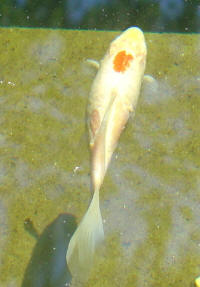 Ouch! Ouch! 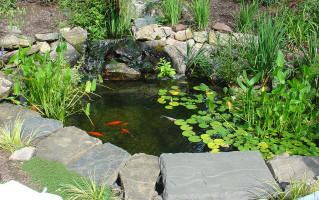 |
|
Re: Whoever wrote "I enjoy being a
girl" definitely wasn't a goldfish 05/20/08
Thanks, Bob. I'm keeping an eye on them all. I'm getting
a little break this week, because we're experiencing a cool
spell here in Media, Pa, that is suppressing the pond temperature
to below 60, so the kids are quieted down. Have you ever seen
such extensive injury? <Ah, yes... worse> I keep hearing
Traffic:"...and the miller he served him worse than that,
for he's ground him between two stones." (John
Barleycorn) Max <Ahh! The rigors of reproduction (and its
avoidance)... BobF> Re: Whoever wrote "I enjoy
being a girl" definitely wasn't a goldfish
05/20/08 Thank you, Dr. Fenner. I do appreciate
your responding. Max <Glad to assist you Max. BobF>
|
Re: Whoever wrote "I enjoy being a
girl" definitely wasn't a goldfish
6/24/08Dear Prof. Fenner, <Heee, yes Max> I'm
happy to report great recovery progress at the end of a
month. Bea is healing well and always did behave normally.
The scrapes on his/her (I'm still not sure) left side
are much smaller, as is the black patch---I suppose
it's a scab---on the left operculum. The scrape on the
right side is much smaller and healed-looking. Bea is just
over 3 years old and now looks to make it to 4. <Ah,
good> Can you suggest a link to a complete fish anatomy?
I would like to know more about the layers of the surface
of the fish. Max <Have many good ref.s in print... Let
me look:
http://www.google.com/search?q=fish+skin+anatomy&rls=com.microsoft:en-us:IE-Address&ie=UTF-8&oe=UTF-8&sourceid=ie7&rlz=1I7PCTA
Nothing jumps out... Bob Fenner>
|
|
 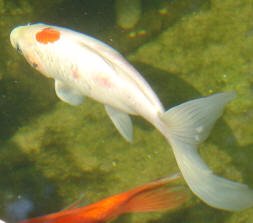
|
|
 |
Aquatic Gardens
Ponds, Streams, Waterfalls & Fountains:
Volume 1. Design & Construction
Volume 2. Maintenance, Stocking, Examples
V. 1
Print and
eBook on Amazon
V. 2
Print and
eBook on Amazon
by Robert (Bob) Fenner |
 |
|
|

